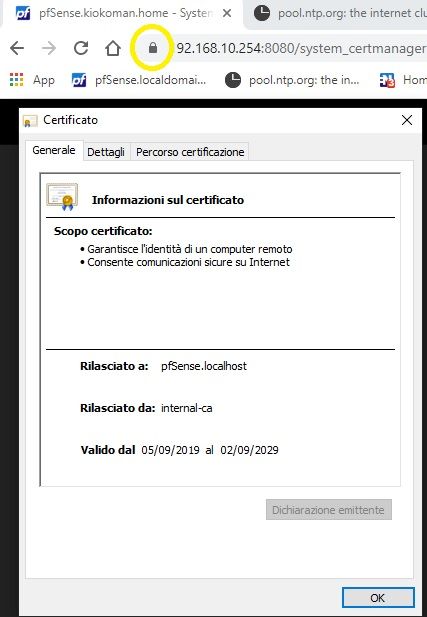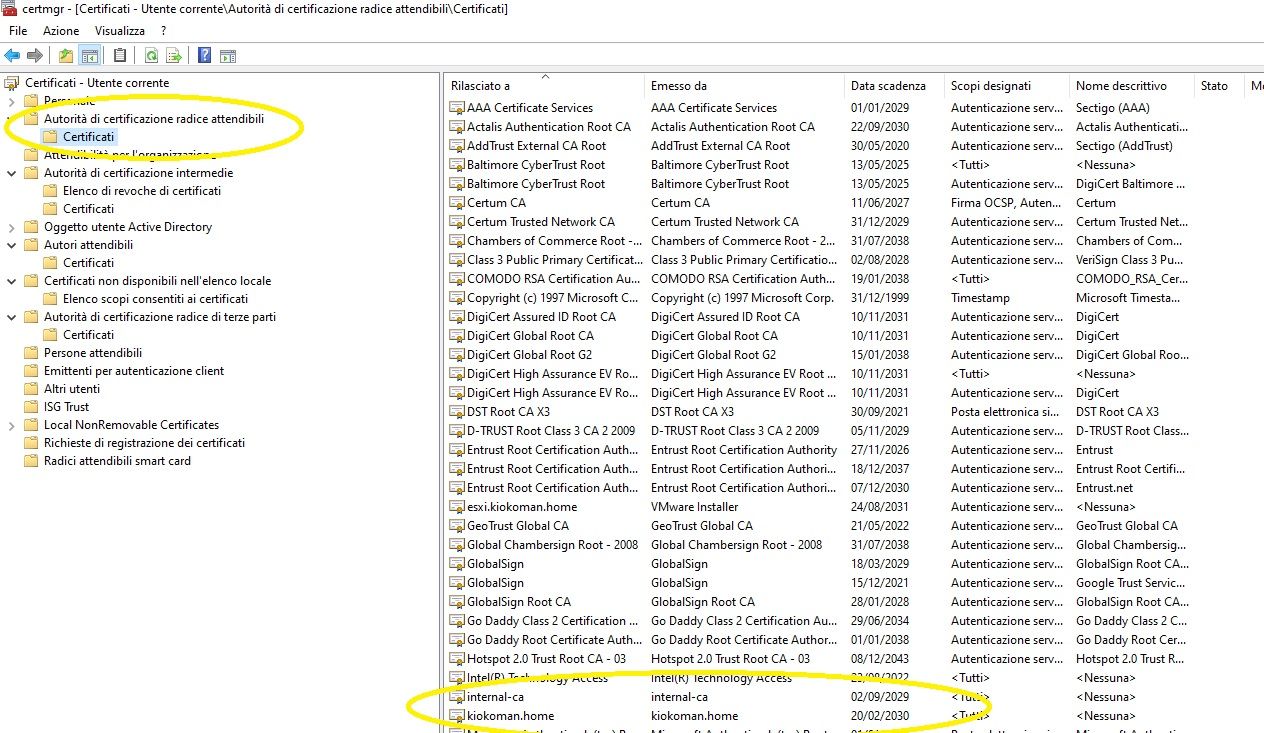ACME localhost
-
@Cr4shOverrid3 said in ACME localhost:
io lo uso normalmete con OpenVPN e non ho riscontrato problemi
Per essere precisi, ho NO-ip come servizio DDNS che ho abbinato a openvpn su pfsense e mi chiedevo se potesse dare qualche problema cambiare adesso inserendo questo certificato.
Non ho capito una cosa però. Quale sarebbero i benefici ad usarlo con openVPN? Non dovrebbe dare l'openVPN già una connessione sicura e criptata?
Grazie -
il certificato è valido solo se usi fqdn e non l'indirizzo ip interno inoltre esporre l'interfaccia web del firewall verso internet è considerato malpractice
-
@kiokoman ok e allora come faccio a raggiungere il firewall da internet senza usare una vpn ?
-
non lo devi fare,punto, si usa la vpn se proprio si ha necessità di accedere a pfsense
-
@kiokoman ok chiaro ma per il certificato in locale è possibile ? ogni volta che accedo da un browser mi compare quella fastidiosa dicitura del certificato non valido.
-
@Cr4shOverrid3 said in ACME localhost:
@kiokoman ok chiaro ma per il certificato in locale è possibile ? ogni volta che accedo da un browser mi compare quella fastidiosa dicitura del certificato non valido.
Mi pare di averlo visto in un videotutorial. Non ne capisco però a pieno l'utilità
-
@kiokoman said in ACME localhost:
il certificato è valido solo se usi fqdn e non l'indirizzo ip interno inoltre esporre l'interfaccia web del firewall verso internet è considerato malpractice
dici esporla usando DDNS invece che la VPN?
-
-
@Cr4shOverrid3 said in ACME localhost:
@kiokoman ok chiaro ma per il certificato in locale è possibile ? ogni volta che accedo da un browser mi compare quella fastidiosa dicitura del certificato non valido.
Puoi usare sempre il tutorial che ti hanno indicato all'inizio.
Installare il certificato generato da let's encrypt non implica che tu debba pubblicare l'interfaccia web.
La modalità descritta sfrutta le query dns.
Ciao Fabio -
@fabio-vigano said in ACME localhost:
@Cr4shOverrid3 said in ACME localhost:
@kiokoman ok chiaro ma per il certificato in locale è possibile ? ogni volta che accedo da un browser mi compare quella fastidiosa dicitura del certificato non valido.
Puoi usare sempre il tutorial che ti hanno indicato all'inizio.
Installare il certificato generato da let's encrypt non implica che tu debba pubblicare l'interfaccia web.
La modalità descritta sfrutta le query dns.
Ciao FabioSi può usare anche in locale allora?
Grazie -
Certo, l'importante è che se fai emettere un certificato a let's encrypt il dominio per cui lo emetti sia un dominio valido.
per capirci, puoi fare emettere un certificato per firewall.miodominio.it ma non puoi far emettere un certificato per firewall.miodominio.localCiao fabio
-
@fabio-vigano said in ACME localhost:
Certo, l'importante è che se fai emettere un certificato a let's encrypt il dominio per cui lo emetti sia un dominio valido.
per capirci, puoi fare emettere un certificato per firewall.miodominio.it ma non puoi far emettere un certificato per firewall.miodominio.localCiao fabio
Quindi bisogna fare delle modifiche. Però mi chiedevo se queste modifiche poi possono compromettere (magari dico una sciocchezza) il funzionamento di altre servizi come openvpn ad esempio.
Grazie -
@fabio-vigano said in ACME localhost:
Certo, l'importante è che se fai emettere un certificato a let's encrypt il dominio per cui lo emetti sia un dominio valido.
per capirci, puoi fare emettere un certificato per firewall.miodominio.it ma non puoi far emettere un certificato per firewall.miodominio.localCiao fabio
Scusami ancora. Giusto per essere sicuri.
ma qui non dvo toccare niente?

Quando parli di dominio ti riferisci solo quello da registrare su let's encrypt?
Grazie

